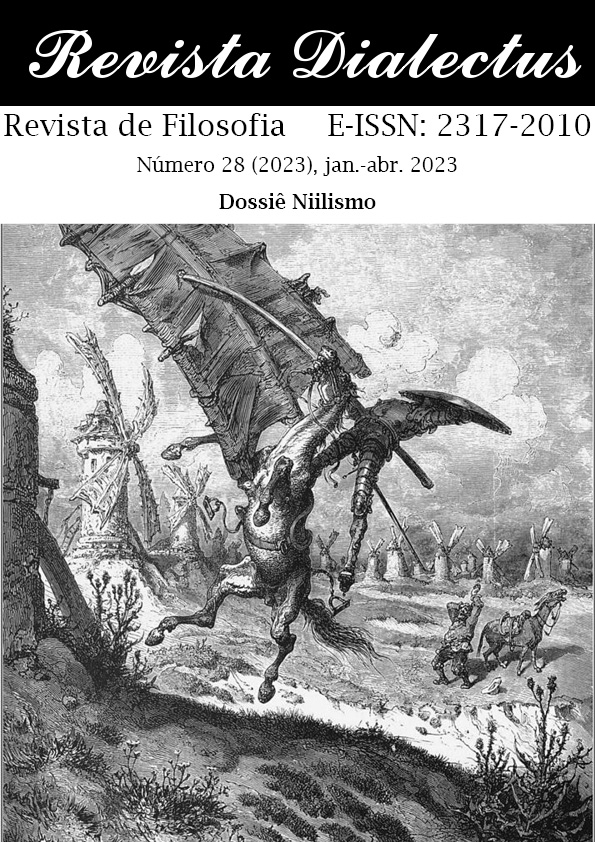NIILISMO ADMINISTRATIVO: CONSIDERAÇÕES SOBRE UMA RÁPIDA MENÇÃO DE NIETZSCHE A UMA CRÍTICA DE THOMAS HUXLEY A HERBERT SPENCER
DOI:
https://doi.org/10.30611/2023n28id86628Keywords:
Adaptação, Desenvolvimento, Estado, Niilismo, Vontade de potênciaAbstract
O niilismo é um tema importante em Genealogia da moral (1887) e está estreitamente associado a seus conceitos principais. No entanto, no parágrafo 12 da II Dissertação dessa obra, e somente nele, aparece o termo “niilismo administrativo” (administrativen Nihilismus) sem nenhuma explicação de seu sentido, a não ser que se trata de uma censura que Thomas Huxley fez a Herbert Spencer. Nesse parágrafo, Nietzsche apresenta o principal pressuposto de seu procedimento genealógico: a função de uma estrutura, seja ela um organismo vivo ou uma instituição cultural, que ocorre em um determinado momento, não nos diz nada sobre a origem dessa mesma estrutura. Esse pressuposto, somado à noção de vontade de potência, antagoniza-se à concepção spenceriana de adaptação. Nesse contexto, o objetivo deste artigo, por meio principalmente da análise do ensaio Administrative Nihilism (1871) de Huxley, é esclarecer o papel que a rápida menção ao niilismo administrativo exerce no parágrafo citado de Genealogia da moral, especificamente na crítica nietzschiana contra Spencer.
Downloads
References
about/living-heritage/transformingsociety/livinglearning/school/overview/1870educationact/. Acessado em: 08/08/2022.
AZEREDO, V. D. Nietzsche e a dissolução da moral. São Paulo, Ijuí: Discurso, UNIJUÍ, 2000. (Sendas & Veredas)
BÍBLIA SAGRADA. Tradução da Vulgata: Pe. Matos Soares. São Paulo: Edições Paulinas, 1979.
BOWLER, P. J. The Eclipse of Darwinism: Anti-Darwinian Evolution Theories in the Decades around 1900. Baltimore: The Johns Hopkins University, 1992.
BRUSOTTI, M. Die “Selbstverkleinerung des Menchen” in der Modern Studie zu Nietzsches “Zur Genealogie der Moral”. In: Nietzsche Studien, Berlin, v. 21, 1992, p. 81-136.
CAMPIONI, G. Beiträge zur Quellenforschung. In: Nietzsche Studien, v. 19, 1990, p. 532-538.
CAMPIONI, G. et al. Nietzsches persönliche Bibliothek (BN). Berlin: Walter de Gruyter, 2002.
CAPONI, G. Historia del ojo: Nietzsche para darwianianos; Darwin para nietzschianos. In : Temas e Matizes, Cascavel, v. 8, n. 15, 2009, p. 10-26.
____.Herbert Spencer: entre Darwin y Cuvier. In: Scientiae Studia, São Paulo, v. 12, n. 1, 2014, p. 45-71.
DARWIN, C. R. On the Origin of Species by Means of Natural Selection, or the Preservation of Favoured Races in the Struggle for Life. 1st ed. London: John Murray, 1859.
EMDEN, C. J. Nietzsche’s Naturalism: Phylosophy and the Life Sciences in the Nineteenth Century. Cambridge: Cambridge University Press, 2014.
ESPINAS, A. Die thierischen Gesellschaften: eine vergleichend-psychologische Untersuchung. Braunschweig: Vieweg, 1879. Disponível em: https://books. google.com.br/bo
oks?id=JRZVAAAAMAAJ&printsec=frontcover&hl=pt-BR&source=gbs_ge_summary_r&c
ad=0#v=onepage&q&f=false. Acessado em: 05/08/2022.
ESPINOSA, B. Tratado da emenda do intelecto. Tradução de Cristiano N. de Rezende. Campinas: UNICAMP, 2015.
FREZZATTI Jr., W. A. Nietzsche contra Darwin. 2a edição ampliada e revista. São Paulo: Edições Loyola, 2014. (Sendas & Veredas)
____. Nietzsche e a psicofisiologia do século XIX. São Paulo: Humanitas, 2019. (Nietzsche em Perspectiva)
____. A fisiologia de Nietzsche: A superação da dualidade cultura/biologia. 2ª ed. Curitiba: CRV, 2022. (Nietzsche em Perspectiva)
FRIEDRICH NIETZSCHE’S LIBRARY. The Nietzsche Channel. Disponível em: http://www.thenietzschechannel.com/library/library.htm. Acessado em: 05/08/2022.
HOBBES, T. Leviathan. Oxford: Clarendon Press, 1965.
HUXLEY, T. Administrative Nihilism. In: Fortnightly Review, v. 10 (new series, or v. 16 old series), jul.-dec. 1871, p. 525-543. Disponível em: https://babel.hathitrust.org/cgi/pt?id=
uiug.30112119815014&view=1up&seq=533&skin=2021. Acessado em: 05/08/2022.
LOCKE, J. Segundo tratado sobre o governo. Tradução de E. Jacy Monteiro. São Paulo: Abril Cultural, 1973. (Os Pensadores)
____. A Letter Concerning Toleration and Others Writings. Indianapolis: Liberty Fund, 2010.
MARTON, S. Nietzsche: Das forças cósmicas aos valores humanos. 2ª ed. Belo Horizonte: UFMG, 2000.
MOORE, G. Beiträge zur Quellenforschung. In: Nietzsche Studien, Berlin, v. 27, 1998, p. 535-551.
____. Nietzsche, Biology and Metaphor. Cambridge: Cambridge University Press, 2006.
NIETZSCHE, F. W. Genealogia da moral. Tradução: Paulo César de Souza. São Paulo: Companhia das Letras, 1998.
____. Sämtliche Werke. Kritische Studienausgabe (KSA). G. Colli und M. Montinari (Hg). Berlin: Walter de Gruyter, 1999. 15 Bd.
____. Aurora. Tradução de Paulo César de Souza. São Paulo: Companhia das Letras, 2004.
ORSUCCI, A. Beiträge zur Quellenforschung. In: Nietzsche Studien, Berlin, v. 22, 1993, p. 371-388.
SEMPER, K. Die natürlichen Existenzbedingungen der Thiere. Leipzig: Brockhaus, 1880. 2 v.
SPENCER, H. The Principles of Biology. v. I. London: Williams and Norgate, 1864.
____. First Principles. 2nd ed. London: Williams and Norgate, 1867.
THATCHER, D. S. Zur Genealogie der Moral: Some textual Annotations. In: Nietzsche Studien, Berlin, v. 18, 1989, p. 587-599.
Downloads
Published
Issue
Section
License
Authors who publish in this journal agree to the following terms:
- Authors retain the copyright and grant the journal the right of first publication, with the work simultaneously licensed under the Attribution-NonCommercial-NoDerivatives 4.0 International (CC BY-NC-ND 4.0) License, which allows the non-commercial sharing of work, without modifications and with acknowledgment of authorship and initial publication in this journal.
- Authors are authorized to take additional contracts separately, for non-exclusive distribution of the version of the work published in this journal (eg publish in institutional repository or as a book chapter), with acknowledgment of authorship and initial publication in this journal.
- Authors are allowed and encouraged to publish and distribute their work online (eg in institutional repositories or on their personal page) at any point before or during the editorial process, as this can generate productive changes as well as increase the impact and citation of published work (See The Free Access Effect).



















